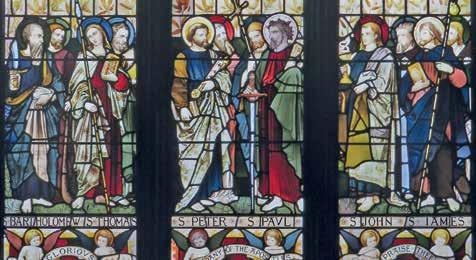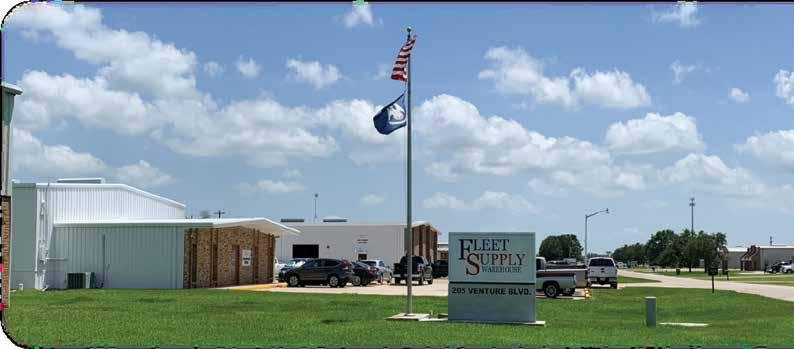
6 minute read
Readings Between the Lines
Reflections
We are part of the story of Acts
Readings Between the Lines
Father Glenn LeCompte
At Masses throughout the Easter season the first reading comes from Acts of the Apostles. I thought it would be fitting, then, for this month’s article to focus on that book.
The author of Acts does not identify himself, but several factors point to Luke, the author of the third Gospel, as the author of Acts. Both works have a prologue addressed to a certain “Theophilus” (Luke 1:1-4; Acts 1:15), and in Acts 1:1 the author refers to “the first book,” meaning that Acts is connected to another work. The vocabulary, writing style and theological themes in both works are very similar.
Luke views God’s plan of salvation, or “salvation history,” in three phases: 1) the period of Israel, 2) the period of Jesus, 3) the period of the church. Acts is the story of the beginning of the third phase. In the first scene of Acts (1:6-12) the risen Lord addresses his apostles for the last time before he ascends to the Father, and directs them to undertake a mission as “witnesses” to him, meaning that they will testify to all that Jesus said and did, and explain how he brought God’s plan of salvation to fruition.
The key verse in understanding the Acts of the Apostles is 1:8, when the risen Lord says to the Eleven (the Twelve minus Judas who is dead), “you will receive power when the Holy Spirit comes upon you, and you will be my witnesses in Jerusalem, throughout Judea and Samaria, and to the ends of the earth.” Three of Luke’s key themes are contained in this one sentence. First, the very same Holy Spirit who empowered and guided Jesus’ ministry in Luke (see 4:16-21) does the same for the apostles, who are instructed by the risen Lord to await the gift of the Holy Spirit (Acts 1:4). Secondly, they are to await the Spirit’s coming in Jerusalem, the city where Jesus suffered, died and rose obtaining forgiveness of sin for all people. Finally, from this central geographical hub of salvation history, the apostles will proceed to bring the good news to the “ends of the earth.”
As the story unfolds the apostles are not initially aware that they are to preach beyond the confines of Jerusalem. In the scene of the descent of the Holy Spirit and Peter’s Pentecost speech (2:1-41) it is clear from the makeup of the crowd, people from many nations for whom Peter’s speech is relevant, that the message is not just for Jews but for all people. Nevertheless, it is not until 8:4 that the mission spreads outside of Judea and into Samaria. Why does this happen? Persecution is the reason. Although the apostles return to their ministry in Jerusalem after the Jewish Religious Leaders persecute them (4:1-22), it is in the aftermath of the martyrdom of Stephen (7:59-60) that persecution becomes so severe that Christian missionaries are driven north into Samaria. Stephen was one of the seven servants appointed to wait on Greekspeaking widows (6:1-7), but who also preach (7:2-53; 8:5-8). Saul, a Pharisee, is a great instigator of the persecution of Christians (8:1). At this point it may seem to the reader that the mission is endangered. In fact, the treachery the church faces plays right into God’s plan for the Gospel to spread, just as the Jewish religious leaders’ arranging of Jesus’ death also facilitated the divine purpose.
The mission to Samaria spreads into Syria, and Saul obtains authorization to seek out followers of Jesus in Damascus (9:1-2). On the way there, he is confronted by the risen Lord (9:3-9), is taken to Antioch in Syria and begins a process of conversion (9:10-19). His name changes to Paul (13:9). Word gets back to the church in Jerusalem that Gentiles are accepting the faith (11:1). Peter is confronted by other Jews for entering the homes of uncircumcised Gentiles to bring them the good news. But he explains a vision (a biblical medium of divine revelation) which indicated to him that this was God’s desire (11:5-10).
The persecution drives the mission even farther out, into Phoenicia, Cyprus and Syrian Antioch (11:19), and in each of these places those scattered there announce the good news to Gentiles and they accept it. Eventually word gets back to Jerusalem that Gentiles are accepting the Gospel and even preaching it, so the Jerusalem church sends Barnabas to
Reflections
Antioch to check out the situation (11:19-22). Barnabas goes to Paul’s hometown, Tarsus, finds him there and brings him back to Antioch. They spend a year evangelizing in that area and make a sizeable number of converts (11:23-26). After more debates over admittance of Gentiles to the Christian Way, the church in Jerusalem decides that the only food laws Gentiles are required to observe are abstention from meats offered in sacrifice to idols, from blood, and in addition are to avoid “unlawful marriage” (15:29). James, the leader of the Jerusalem church, announces that this decision is not only authorized by the church leadership, but by them under the guidance of the Holy Spirit (15:28).
The decision about requirements for Gentiles entering the church happens after Paul and Barnabas embarked upon a missionary journey into Cyprus and Asia Minor (modern-day Turkey, 13:4-14:28). After the meeting about Gentiles by church leaders in Acts 15, the rest of Acts focuses on the missionary journeys of Paul, who goes through several incarcerations and a number of experiences of persecution. As was the case earlier in Acts, the persecutions simply drive Paul to other towns and countries and enable the word of God to continue its spread, especially to Gentiles, to the ends of the earth. Paul is arrested by Jews and taken by them before Roman prefects to be tried, but Paul, being a Roman citizen, makes use of his right of appeal, especially to the emperor (25:11). It is this appeal to the emperor that causes him to end up in Rome under house arrest, and Acts ends with Paul residing there and evangelizing. Acts never mentions his martyrdom, which occurred probably in 64 A.D.
From Rome, the Gospel did spread to the ends of the earth, as is evidenced by the fact that we have embraced Christianity. Many biblical commentators have noted that Acts does not seem to have an adequate story-ending. Maybe the reason is that the story continued with the early church’s evangelization work and continues today as we do our part to spread the good news. BC
Reflection Questions
v How has difficulty caused you at times to change the way you serve the Lord? v The early church had to discern, under guidance by the Holy Spirit, how to deal with Gentiles who wished to embrace the faith. What issues today require the church’s Spiritguided discernment? v How do you see yourself fitting into the ongoing story of Acts of the
Apostles? 205 Venture Boulevard
Houma, LA 70360
Locally owned since 1974 205 Venture Boulevard Houma, LA 70360 Tel: 985-868-0430 Mon-Fri 7:30 AM - 5:00 PM www.fleetsupplywhse.com FS LEET UPPLY WAREHOUSE LOCALLY OWNED SINCE 1974











